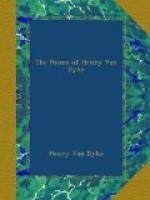II
What
rapture of new life
Must come to one for whom a silent world
Is suddenly made vocal, and whose heart
By the same magic is awaked at once,
Without the learner’s toil and long
delay,
Out of a night of dumbly moving dreams,
Into a day that overflows with music!
This joy was Vera’s; and to her
it seemed
As if a new creative morn had risen
Upon the earth, and after the full week
When living things unfolded silently,
And after the long, quiet Sabbath day,
When all was still, another day had dawned,
And through the calm expectancy of heaven
A secret voice had said, “Let all
things speak.”
The world responded with an instant joy;
And all the unseen avenues of sound
Were thronged with varying forms of viewless
life.
To every living thing a voice was given
Distinct and personal. The forest
trees
Were not more varied in their shades of
green
Than in their tones of speech; and every
bird
That nested in their branches had a song
Unknown to other birds and all his own.
The waters spoke a hundred dialects
Of one great language; now with pattering
fall
Of raindrops on the glistening leaves,
and now
With steady roar of rivers rushing down
To meet the sea, and now with rhythmic
throb
And measured tumult of tempestuous waves,
And now with lingering lisp of creeping
tides,—
The manifold discourse of many waters.
But most of all the human voice was full
Of infinite variety, and ranged
Along the scale of life’s experience
With changing tones, and notes both sweet
and sad,
All fitted to express some unseen thought,
Some vital motion of the hidden heart.
So Vera listened with her new-born sense
To all the messengers that passed the
gates,
In measureless delight and utter trust,
Believing that they brought a true report
From every living thing of its true life,
And hoping that at last they would make
clear
The mystery and the meaning of the world.
But soon there came a trouble in her joy,
A note discordant that dissolved the chord
And broke the bliss of hearing into pain.
Not from the harsher sounds and voices
wild
Of anger and of anguish, that reveal
The secret strife in nature, and confess
The touch of sorrow on the heart of life,—
From these her trouble came not.
For in these,
However sad, she felt the note of truth,
And truth, though sad, is always musical.
The raging of the tempest-ridden sea,
The crash of thunder, and the hollow moan
Of winds complaining round the mountain-crags,
The shrill and quavering cry of birds
of prey,
The fiercer roar of conflict-loving beasts,—
All these wild sounds are potent in their




